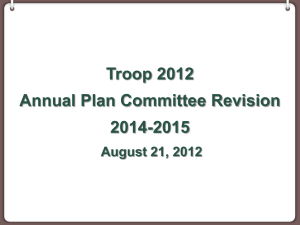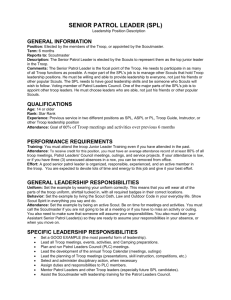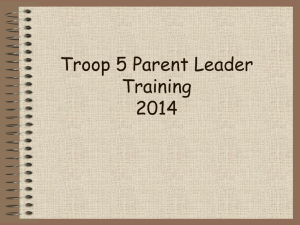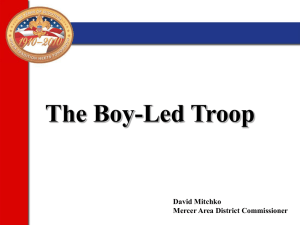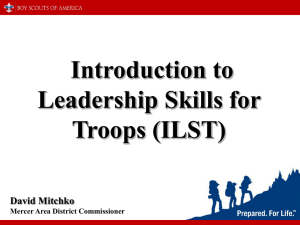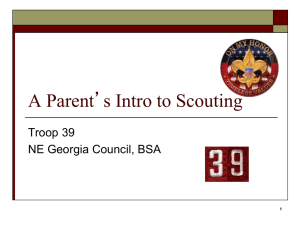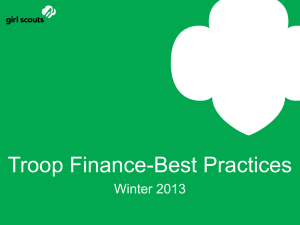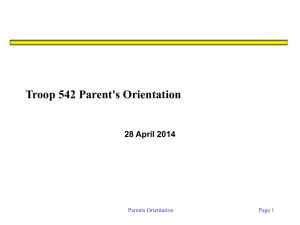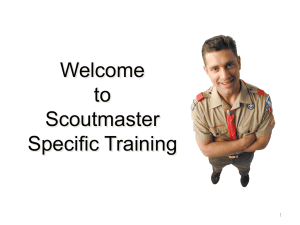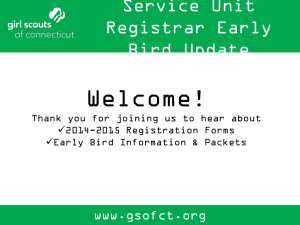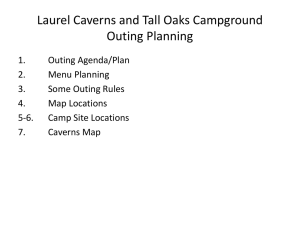New Parent Information
advertisement
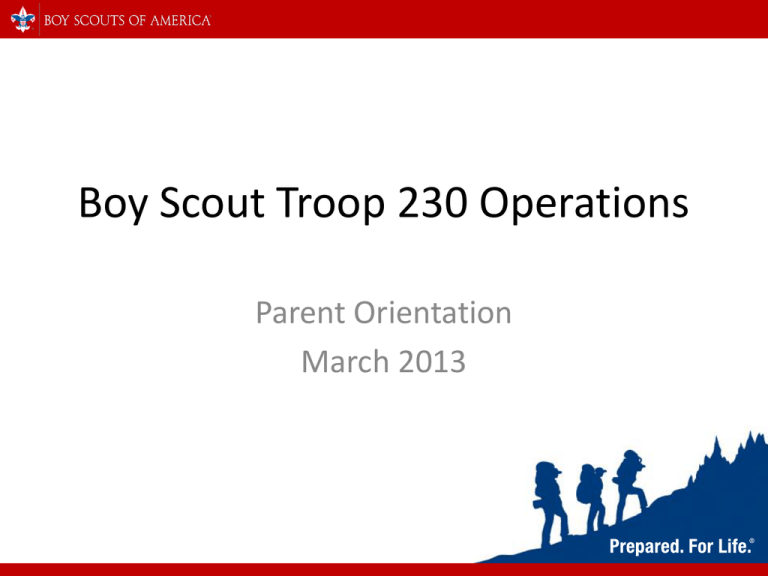
Boy Scout Troop 230 Operations Parent Orientation March 2013 Boy Scout Aims Boy Scouts of America (BSA) works towards three aims through the application of eight (8) methods. • Moral Strength and Character – A Scout is defined by his personal qualities, values, and outlook. • Participating Citizenship – Citizenship means dealing with others. A Scout learns about his obligations to other people, society, and to the government that presides over our society. • Development of physical, mental, and emotional fitness – This includes fitness of the body (health), mind (thinking and problem solving), and emotions (selfcontrol, courage, and self-respect). Boy Scout Methods • • • • • • • • Ideals - Scout Oath, Law, motto, and slogan Patrols - an experience in group-living and participating citizenship; teaches boys to accept responsibility Outdoors - skills and activities practiced at troop meetings come alive with purpose Advancement - at his own pace; overcomes challenges; rewarded for achievement, gain selfconfidence Adult Association - learn from examples set by adult leaders Personal Growth - Good Turn - Scouts grow as they participate in community service projects; religious emblems program Leadership Development - learn and practice leadership skills; helps a scout accept the leadership roles of others and guides him toward the citizenship aim of Scouting. Uniform - creates a positive youth image; demonstrates commitment; identity in a world brotherhood of youth who believe in the same ideals BSA Program Overview • Motto – Be Prepared • Slogan – Do a Good Turn Daily • Oath On my honor, I will do my best to do my duty to God and my country, and to obey the Scout Law; to help other people at all times; to keep myself physically strong, mentally awake, and morally straight. • Law A Scout is trustworthy, loyal, helpful, friendly, courteous, kind, obedient, cheerful, thrifty, brave, clean, and reverent. Organization “KEY 3” • • • • • Southern Region Area 3 Sam Houston Area Council Texas Skies District St. Peter’s UMC Chartered Org Rep (President): Jere Dial • Committee Chair (CEO): Stephanie Thibodeaux • Scoutmaster (COO): David McMasters Senior Patrol Leader - Elected every 6 months Spring 2013 – Asa Grimsley National Council, BSA Region Area Local Council District Chartered Organization Unit Committee Units – Packs, Troops, Crews, Teams, Posts, Ships, Etc. Patrol Leaders’ Council Boy Scouts is "Boy-Led." The Patrol Leaders' Council (PLC), not the adult leaders, is responsible for planning and conducting the troop's activities. The Scoutmaster (with support from Assistant Scoutmasters) provide direction, coaching, and training that empowers the boys with the skills they will need to lead the troop. The Scoutmaster also serves as the liaison between the PLC and the Troop Committee, which provides resources for troop activities. Youth Leaders meet monthly to plan weekly meetings and activities. Each Patrol is always represented at each monthly PLC meeting. If the Patrol Leader is not able to attend, the Assistant Patrol Leader or another Scout delegate from the patrol will attend the PLC. The Patrol Leaders present the ideas and concerns of their patrols and in turn share the decisions of the patrol leaders' council with their patrol members. Senior Patrol Leader Asa Grimsley (Spring 2013) Assistant SPLs Adrian Duran John Eenink Zach Walker Troop Guides Rohan Chakraborty Eric Cortez Harrison Dial Patrick Edelman Cameron Garik Cole Hedgpeth Andrew McMasters Grant Noce Graham White Patrol Leaders Scribes Alex Diebert John Nicholson Quartermasters Hillis Gussett Stephen Meaux Activity Coordinator Morgan Long Bobcat: Ashish Chakraborty Raven: Christian Martinez Shark: Sean Scheupbach Stag: Jack Janik 2013 Badger: 2013 Cobra: 2013 Eagle: Ahren Kubiak Patrol Structure Bobcat Raven Shark Stag First Year Patrol(s) Multiple patrols formed, based on enrollment ASM Advisor ASM Advisor ASM Advisor ASM Advisor ASM Advisors Youth Leadership / Adult Advisors Webmaster OPEN Susan Bock Librarian Rysen Shirzadi Open • • Scribe Alex Diebert John Nicholson Brad Freudenberg Jackie Kerstetter Historian Shane Mack Open Quartermaster QM - Flags (New) Hillis Gussett Stephen Meaux Joey Grass Joseph Mullen Steve Smith Travis Beaman Joseph Mullen James Netland Jere Dial – Coach Mark Netland – Database Brent Broadrick - Supplies Bill Beck Jere Dial (Flag Inv) Den Chief Chaplain Aide Bugler OA Troop Rep. OPEN Open Leadership positions not required for advancement until 1st Class achieved All positions require “meaningful” leadership and sign-off by Scoutmaster, ASM or Committee mentor Mason Mulry Open Zane Barham Leave No Trace OPEN Open Key Resources • Troop website: www.troop230.org – Troop Calendar link – Forms, Contacts, Resource Links – Troop Operations Manual (under construction) • • • • • Newsflash E-mails (Susan Bock) Announcements (beginning/ending of troop meetings) Guide to Safe Scouting Guide to Advancement Boy-Led Troop Info Troop Program Elements • Advancement – Scout Skills Development • First Class Emphasis program – Leadership – Merit Badges • Troop offerings Fall and Spring – Service Hours • Eagle Projects • Troop-wide • Camping – one outing each month • Training – once every 12 months – Introduction to Leadership Skills for Troops (ILST) How do we pay for all this fun? • Flags Across America Program – Routes are sold for $30/yr (Scout gets $17, Troop gets $13) • Dues Assessment – $130 annually – No dues assessed if Scout has 10 active/paid flag accounts • Fees – Grub (campout meal planning - $15 per campout) – Activity specific (canoeing, climbing, etc.) • Popcorn Sales – Scout receives 100% of profit What does Boy-Led mean? For more details, read Boy-Led Troop Info on Troop website under “Troop Operations” What does Boy-Led look like? “Empowering scouts to be leaders” - the core of Scouting Scouts take responsibility for planning activities and achievements Scoutmaster and ASMs provide direction, coaching and training. Troop Committee provide resources to support PLC decisions. What does it mean for the boys? • • • • • • Opportunity to plan, organize and make decisions A supervised environment to practice leading others A safe place to make mistakes and learn from them Learn how to coach others to be successful Learn the importance of working as a team A chance to be creative Servant Leadership & Responsibility Individual Scout Responsibilities • Attend and participate in weekly meetings, monthly campouts and other activities • Respect one another and allow fellow scouts to lead • Be responsible for their own actions • Create solutions as a team • Actively participate in planning and executing events and activities Adult Roles in a Boy-Led Troop • • • • • • • • • Mentor Guide Counsel Advise Train Provide logistics Support Encourage Safety …to provide safety and support How can I get involved? • Encourage participation / achievement (don’t push too hard) • If you actively participate, your son will too – many open adult leader positions – Troop cannot operate effectively without adult leader support • No Scouting experience necessary / required • Success is a journey, not a destination • Our goal is not to create Eagles, but instead to develop great men of strong character Committee – Currently Recruiting • • • • • • • Activities Chair (Camping Activity Coordinator) Treasury – Disbursements Treasury – Accounting & Reporting New Member Coordinator Popcorn Sales Chair Historian Advisor Merit Badge Assistant – Librarian Advisor Requirements to Participate • Membership Application (Youth / Adult) • BSA Medical Form Parts A & B (Youth / Adult) – Part C required for high adventure and long term camps • Youth Protection Training (Adult) • Camping Equipment Policy Acknowledgment • Conduct & Discipline Policy Acknowledgment Camping Equipment Policy • To resolve issues with Scout use and care of troop equipment • Establish accountability for condition of equipment • Administered by Quartermasters / PLC with support from Troop Committee • What’s different? – Effective August 2013, each participant must have their own mess kit for dining during campouts – Replacement cost assessments for missing or intentionally damaged items Conduct & Discipline Policy • To clearly communicate safety and behavior expectations and consequences • To establish a structure for consistent discipline • Parent support for discipline is mandatory • No new expecations – except that acknowledgment is now required for participation Question & Answer
